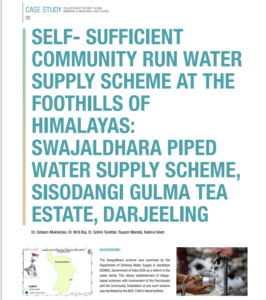News
Study by SIGMA Foundation Reveals Urgent Need for Multi-Faceted Approach to Combat Tuberculosis in Kolkata
Dated: 5th September 2024
Tuberculosis (TB) continues to be a significant public health challenge in India, which accounts for nearly 27% of the global TB burden. According to the report, Kolkata’s slum areas, marked by overcrowding, poor living conditions, malnutrition, and limited access to healthcare, act as hotspots for the disease transmission. A comprehensive study has been conducted by SIGMA Foundation on the status of TB in Kolkata. 210 TB patients across eight chest clinics under the Kolkata Municipal Corporation were surveyed through a structured questionnaire. The findings of the study highlight key socio-economic, behavioural, and healthcare-related factors contributing to the spread of TB in Kolkata, which is likely to be true for other similar urban areas.
The report found that more women (60%) under 30 years were affected by TB compared to men (26%). However, the burden shifted to men (56%) after the age of 40 years. The economic toll of TB was evident, with 83% of respondents facing out-of-pocket expenses for treatment. Many experienced impoverishments, job loss, and food insecurity due to the indirect costs of the disease. A significant portion of the patients were unaware of how they contracted TB, with more women reporting exposure to infected family members. A good point is that, despite the financial challenges, over 90% of patients adhered to treatment protocols. The report identified smoking, alcohol use, malnutrition, and co-morbidities like diabetes as common risks for developing TB. Social stigma remains a major challenge, especially for men, with 23% of respondents avoiding disclosing their TB status due to fear of discrimination.
The report calls for a multi-pronged approach to curb the spread of TB in Kolkata. This includes addressing underlying socio-economic conditions, enhancing healthcare infrastructure, promoting awareness, and reducing the stigma associated with TB. With the right interventions, the burden of tuberculosis can be significantly reduced, improving health outcomes for affected populations. The study was funded by SIGMA Foundation and was carried out with the approval and support of the Kolkata Municipal Corporation. The full report has been shared with them for possible interventions.
SIGMA Foundation completes an Assessment of a unique programme on Imparting Land Literacy Among the Scheduled Tribe Women SHG Members
Dated: 2nd September 2024
SIGMA Foundation completed an assessment of Promotion of Land Literacy among the Scheduled Tribe Women SHG members connected with the LAMPS (Large-sized Multipurpose Cooperative Societies) in Jhargram and Bankura Districts. Tribal Development Department, Government of West Bengal, and Landesa Foundation for Innovations in Development (LFID), entered into a collaboration for sensitization and empowerment of female members of ST families connected with the Large-sized Multipurpose Cooperative Societies (LAMPS) in 2022-23. The initiative involved training and developing a resource pool of Master Trainers (MT) / District Level Trainers (DLT) identified by LAMPS, who will gradually take the key learnings to outreach the SHG members in a cascading mode of dissemination of content regarding women land rights.  So far, the project has been implemented in a pilot form in two districts of West Bengal, i.e., Jhargram and Bankura. In the next phase, LFID plans to scale-up the initiative to Purulia and establish LAMPS Facilitation Centre (LFC) in Bankura and Jhargram districts. Against this backdrop, an assessment was planned with the primary objective to have a better understanding of the process and outcome of the land literacy programme before scaling up the programme.
So far, the project has been implemented in a pilot form in two districts of West Bengal, i.e., Jhargram and Bankura. In the next phase, LFID plans to scale-up the initiative to Purulia and establish LAMPS Facilitation Centre (LFC) in Bankura and Jhargram districts. Against this backdrop, an assessment was planned with the primary objective to have a better understanding of the process and outcome of the land literacy programme before scaling up the programme.
The study followed a mixed methods approach, comprising both quantitative and qualitative components. The LAMPS were the primary sampling units. Quantitative data was collected from 40 WLL trained SHG members of the sample LAMPS were interviewed for collecting quantitative data. Qualitative data was collected by conducting 8 FGDs with the SHG members and from 8 other stakeholders through KII. 4 Cases were also documented to get good insight on the results of the programme. The primary survey was conducted in the last week of July 2024, by a team of 4 researchers of SIGMA Foundation. The quantitative data was analyzed using STATA software. On the other hand, the transcripts of qualitative data were prepared from field notes and recordings and were codified for thematic analysis. The report has been shared with the LFID team.
SIGMA Foundation Completes Landscape Study for Gender Integration for Foundational Literacy in Six States of India
Dated: 20th August 2024
SIGMA Foundation has completed a Landscape study for Room to Read in 6 states of India- Madhya Pradesh, Chhattisgarh, Uttar Pradesh, Rajasthan, Uttarakhand and Telangana. The landscape study examined the gendered practices and perceptions in day-to-day activities in school with these research questions- (i) what are the implicit and explicit gender biases among teachers, (ii) what are the ways in which gendered behaviour and practices manifest in teachers (iii) what are children’s perceptions, experiences and responses of gender unequal practices, and (iv) actual gender unequal practices seen in the schools vis-à-vis children’s perceptions and experiences. 15 schools were selected across 4 districts of each of the selected states. Assessment in each school was done through feedback on various activities by the students and teachers and classroom observation by collecting qualitative data. A play-based activity was conducted with a group of students from classes 1 and 2 in each school. A total of 175 teachers were interviewed against a target of 30 teachers in each state, selecting 2 from each school, one head teacher and one assistant teacher. In this process, the researchers spent an entire day in each school to understand the gendered nature of practices and perceptions in the school. The study highlighted how gender segregation and stereotypes are reinforced in schools and also recommend ways how schools can help in imbibing more gender equal practices.

Participation of SIGMA Foundation in a workshop on WASH and Climate Change
Dated: 12th July 2024
SIGMA Foundation was invited to attend the workshop on “Assessing climate extremes-induced risk for the WASH and Health sectors in India” organised by CEEW and UNICEF on 9th July, 2024 at Silver Oak, India Habitat Centre, New Delhi. This day-long workshop addressing the challenges at the intersection of water, sanitation, hygiene, and climate change in the health sector is a critical endeavor and a major domain of interest for SIGMA. It was an enriching and enlightening experience, and SIGMA is grateful for the opportunity to have been a part of it. The workshop was a platform for robust discussions and knowledge exchange with fellow attendees to develop innovative solutions to the indicator selection and ranking on WASH and climate extremes-induced risk assessment. The sessions were highly informative, with expert speakers presenting the latest research. The workshop also promoted the need for strong policies and advocacy to support WASH and climate change initiatives in collaboration with government agencies, NGOs, and international organizations which is essential to drive meaningful change. SIGMA is inspired by the collective commitment to advancing WASH and climate change agendas and look forward to applying the knowledge gained in upcoming works.
Pale and Frail: Failing Status of Indian Women in Anemia and Nutrition
Dated: 3rd July 2024
A chapter titled “Pale and Frail: Failing Status of Indian Women in Anemia and Nutrition” was published on June 29, 2024, by Springer Nature in the book named “Public Health and Diseases: 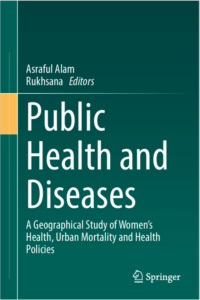 A Geographic Study of Women’s Health, Urban Mortality and Health Policies”. Mayuri Sen and Sangram Mukherjee, both part of the SIGMA Foundation research team, authored the chapter jointly.
A Geographic Study of Women’s Health, Urban Mortality and Health Policies”. Mayuri Sen and Sangram Mukherjee, both part of the SIGMA Foundation research team, authored the chapter jointly. 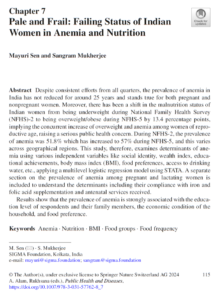 The chapter discusses the disconcerting and lingering issue of low haemoglobin levels in women of childbearing age in India, despite various governmental initiatives in this regard for quite a long time. Consecutive rounds of National Family Health Survey (NFHS) data starting from NFHS 2 has been used to analyse the spatiotemporal changes that occurred during the period, and NFHS 5 data as cross-sectional data to examine the determinants of anaemia. Surprisingly, it was also found that despite the faltering haemoglobin levels, the proportion of women of childbearing age in India with Body Mass Index (BMI) greater than normal has consistently increased across each round of NFHS starting from 10.6% during NFHS-2 to 24% according to NFHS-5. This indicates that the problem lies more in the imbalance and lack of dietary diversity among women than the scarcity of food. The Digital Object Identifier for the paper is https://doi.org/10.1007/978-3-031-57762-8_7
The chapter discusses the disconcerting and lingering issue of low haemoglobin levels in women of childbearing age in India, despite various governmental initiatives in this regard for quite a long time. Consecutive rounds of National Family Health Survey (NFHS) data starting from NFHS 2 has been used to analyse the spatiotemporal changes that occurred during the period, and NFHS 5 data as cross-sectional data to examine the determinants of anaemia. Surprisingly, it was also found that despite the faltering haemoglobin levels, the proportion of women of childbearing age in India with Body Mass Index (BMI) greater than normal has consistently increased across each round of NFHS starting from 10.6% during NFHS-2 to 24% according to NFHS-5. This indicates that the problem lies more in the imbalance and lack of dietary diversity among women than the scarcity of food. The Digital Object Identifier for the paper is https://doi.org/10.1007/978-3-031-57762-8_7
SIGMA Foundation to strengthen water security in Jangipara GP, Hooghly
Dated: 24th June, 2024
SIGMA Foundation with grants from Sign of Hope (Hoffnungszeichen e.V.), Germany has taken an initiative to improve water security of that GP. The interventions will include preparation of a Water Security Plan for the GP, building capacity of the GP to take up activities for sustainable water security as per the proposed plan, monilize the community for their participation in Climate Resilient Water Management (CRWM) and demonstration of technology for water conservation, roof top rainwater harvesting, artificial groundwater recharging at a deeper level, recycling of used water, artifical.
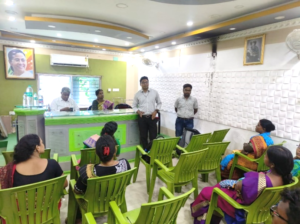
A meeting to brief the GP members about the project and kick start the project activities was organized in the GP office on the 07/06/2024. Professionals of SIGMA Foundation explained the criticality of groundwater, sustainability of the source used for drinking, rapid decline of the groundwater level and how much it has gone down in past few years, possible ways to conserve water etc. and how the project will help to address the issues. This helped them understand the need for proper planning for water security.
The meeting was followed by a field visit of the SIGMA team along with the GP functionaries for identification of potential sites for the installation of the Rooftop Rainwater Harvesting structures based on different site-specific parameters. As the preparation of the water security plan was a new area for the GPs, training of all the GP functionaries on water security and CRWM is going to be scheduled in the first week of July.
SIGMA Foundation submits Final Report on project Suraksha of CRS in Assam
Dated: 6th May, 2024
SIGMA Foundation conducted a study on child trafficking in the North-Eastern states with focus on Assam. The study was commissioned by the North East Diocesan Social Service Society (NEDSSS) with support from Catholic Relief Services (CRS). Based on the findings, a project named ‘Suraksha’ has been conceived by CRS to combat child trafficking in the state, which is being implemented by NEDSSS on a pilot basis in Sorupani Gram Panchayat of Golaghat district of Assam, before the same is scaled up. The project envisages interventions at the levels of the adolescents, their parents, and the community. The expected result of the project is that the vulnerable children in the ages 12-17 years and their families living in the project area will have improved resilience to mitigate the risks of trafficking.
SIGMA Foundation was selected for conducting a baseline study to assess the status of the risk factors of child trafficking, keeping in mind the proposed interventions to mitigate the risk through the Suraksha project. The field work for the assessment, following a mixed method, has been conducted by SIGMA Foundation in the month of January and February 2024.
The final report has been shared with NEDSSS and CRS. The report provides the status of key indicators for the adolescents, their parents/family and the community level. Several recommendations have been made for successful implementation of the pilot project.
SIGMA Foundation reflects on the problem of overexploitation of groundwater in India
Dated: 30th April 2024
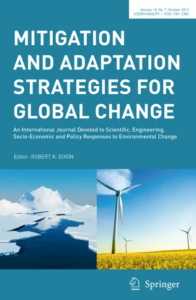 A research paper titled “Groundwater and climate smart agriculture: a reflection from West Bengal, India”, written by Dr. M. N. Roy, Dr. S. Das, R. Mitra and Dr. D. Mukherjee, has been published on 29.04 2024 by Springer Nature B.V. in the leading international cross-disciplinary journal on responses to environmental change, Mitigation and Adaptation Strategies for Global Change. The article explores the reasons for the low level of adaptation to climate change among farmers and discusses the potential solutions to make climate smart agriculture viable in India, in the context of water resource management. The paper discusses the debate on water markets, the importance of ‘gender-smart’ approaches, extension services, ownership of local government and community participation in ensuring adaptation. The article can be found here: https://doi.org/10.1007/s11027-024-10137-1
A research paper titled “Groundwater and climate smart agriculture: a reflection from West Bengal, India”, written by Dr. M. N. Roy, Dr. S. Das, R. Mitra and Dr. D. Mukherjee, has been published on 29.04 2024 by Springer Nature B.V. in the leading international cross-disciplinary journal on responses to environmental change, Mitigation and Adaptation Strategies for Global Change. The article explores the reasons for the low level of adaptation to climate change among farmers and discusses the potential solutions to make climate smart agriculture viable in India, in the context of water resource management. The paper discusses the debate on water markets, the importance of ‘gender-smart’ approaches, extension services, ownership of local government and community participation in ensuring adaptation. The article can be found here: https://doi.org/10.1007/s11027-024-10137-1
Project to reduce cross-border child sex trafficking and re-trafficking of survivors in India, Nepal and Bangladesh
Date: 1st April, 2024
This study was undertaken across the three countries of India, Nepal and Bangladesh as a baseline to a proposed intervention project titled MUKTI South Asia funded by the U.S. Department of State’s Office to Monitor and Combat Trafficking in Persons implemented by ECPAT Luxembourg and its partners. The study sought to establish a baseline point on the following expected project outcomes:
– Improved coordination exists among state and civil society anti-TIP stakeholders (from community to national levels) to ensure resources are effectively managed and distributed to survivors of child sex trafficking.
Strengthened victim centred services provide more responsive and needs based assistance to survivors of child sex trafficking.
– Using the mixed method design, the study surveyed 375 vulnerable adolescent girls, 116 survivors of child sex trafficking and 223 community level stakeholders. Qualitative data was collected from 90 government and NGO functionaries (in-depth individual interviews), 150 mothers (focus-group discussion) and 21 survivors of child trafficking (case studies).
The study was done jointly with SFC Social Development Forum, a partner of SIGMA Foundation.
Case Study by SIGMA Foundation, gets recognized as one of the Best Global Municipal & Industrial Case Studies by Everything about Water (EAW)- India’s First Water E- Magazine
Date: 24th February, 2024
SIGMA Foundation is excited to share that a case study on “Self-Sufficient Community – Run Water Supply Scheme at the Foothills of Himalayas: Swajaldhara Piped Water Supply Scheme, Sisodangi Gulma Tea Estate, Darjeeling” authored by Dr. Debasri Mukherjee (Sr. Research Officer), Dr. M.N. Roy (President), Er. Sohini Tarafdar (Research officer), Mr. Rupam Mondal (Field Officer) and Mr. Kabirul Islam (Field Officer) has been published in the dynamic international Case Study series of Everything About Water (EAW) with Magazine title of “Collection of the Best Global Municipal and Industrial Case Studies, 15th A Collector’s Edition Case Study, Special Annual Issue 2023” (REG No; DELENG/ 2001/3092). Everything About Water is India’s First and the Most Read Water & Waste Water Magazine with 52% Circulation, 36 end user industry and 12% international reach. The case study issue showcases practical content from industry veterans, experienced end-users and global water researchers. It also bag’s the title of India’s biggest annual water directory with maximum reach of 77,000 water professional’s readership and year long shelf life.
